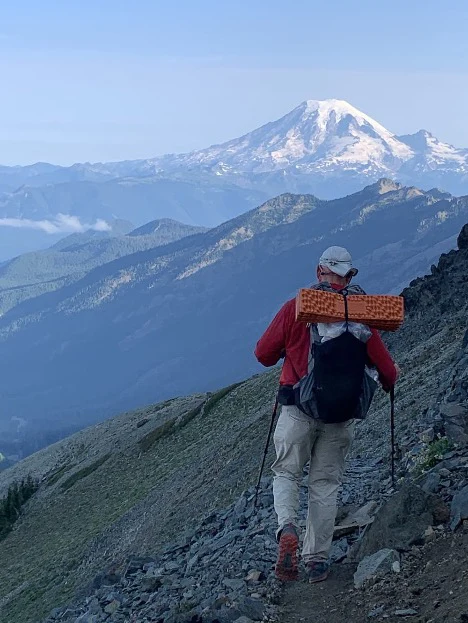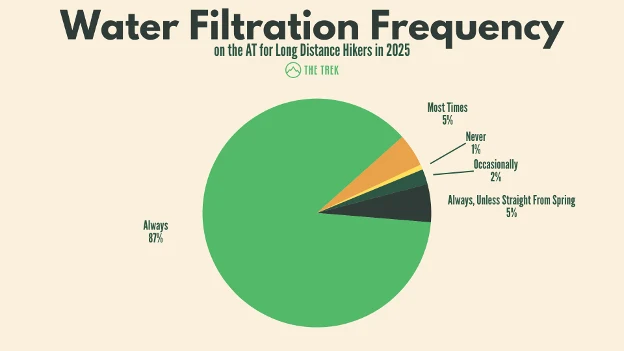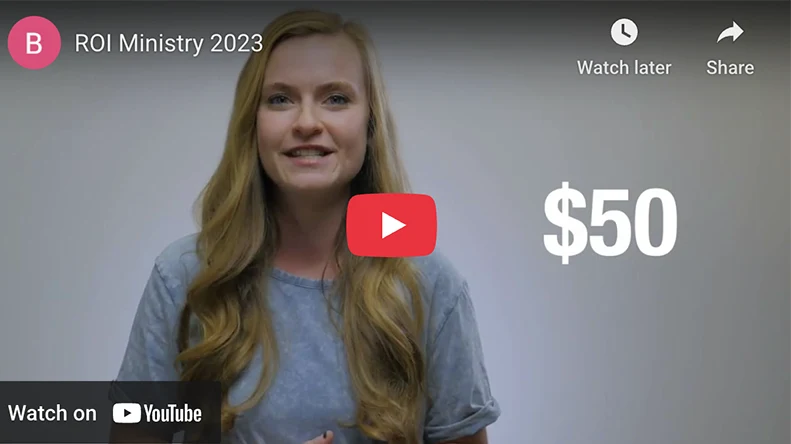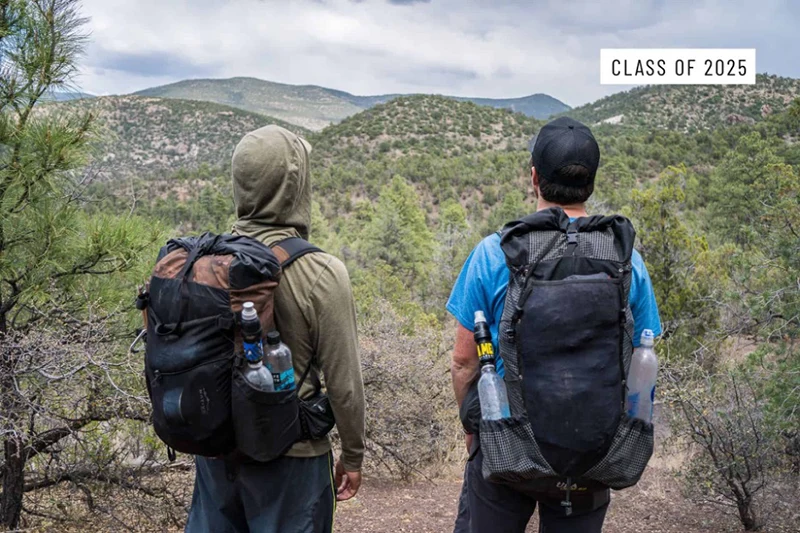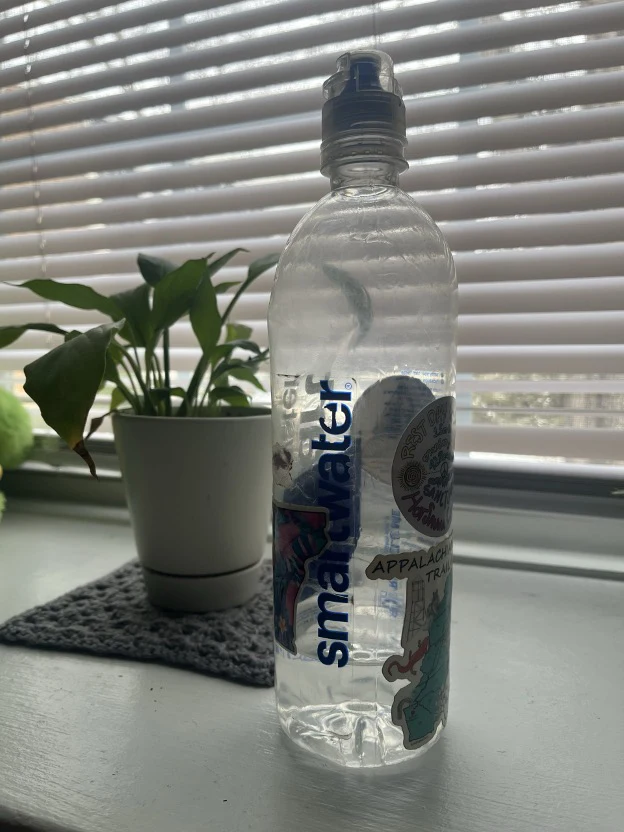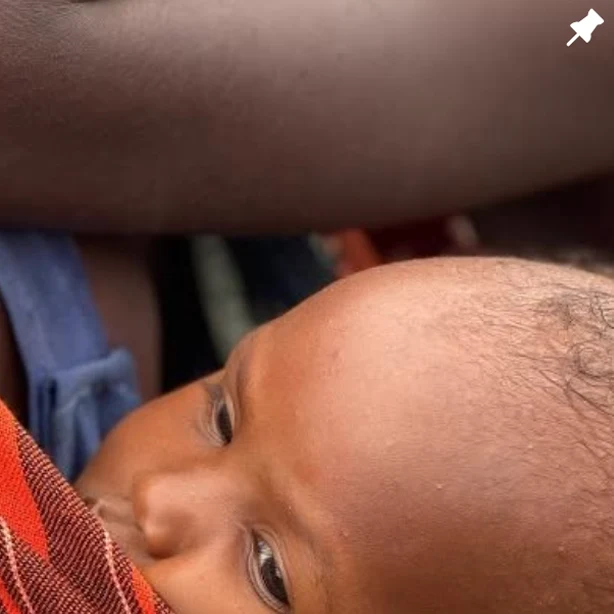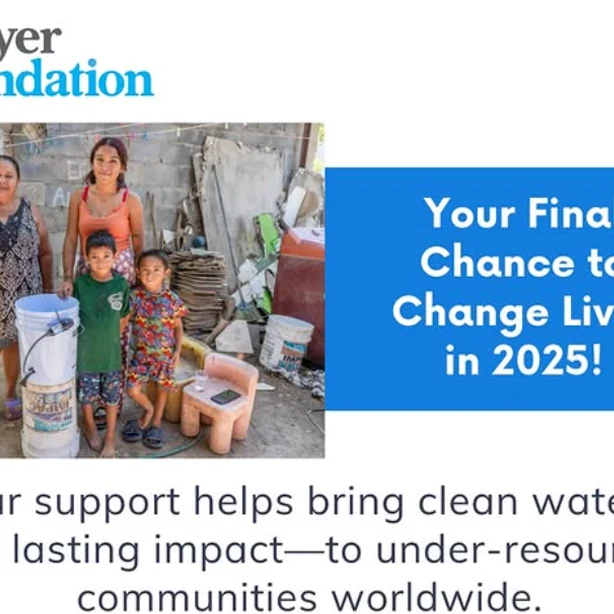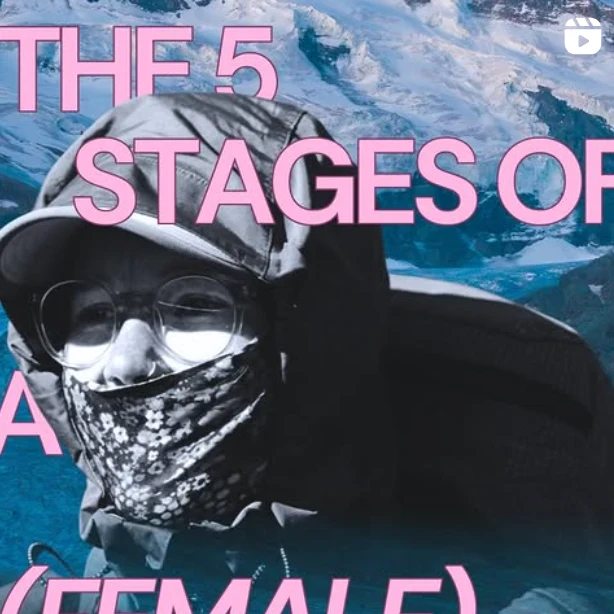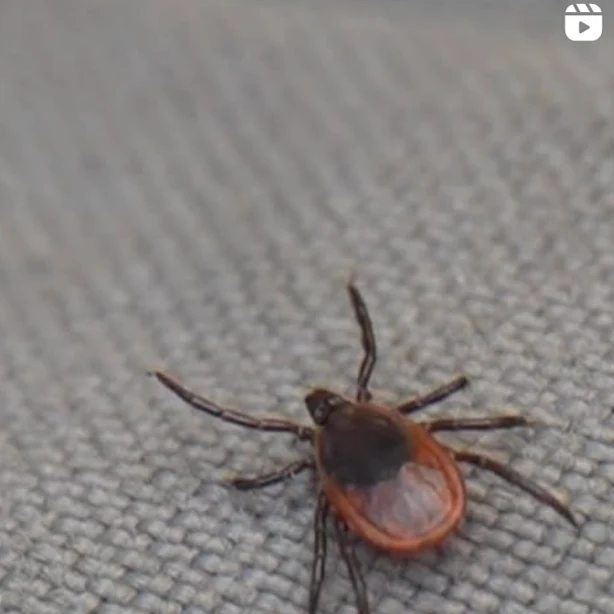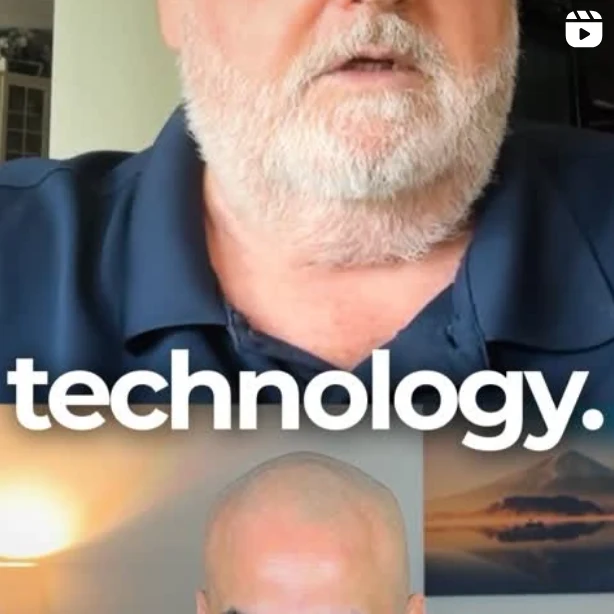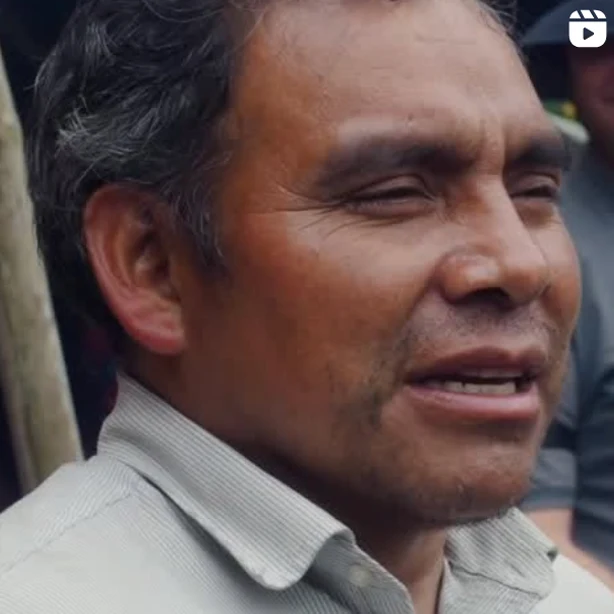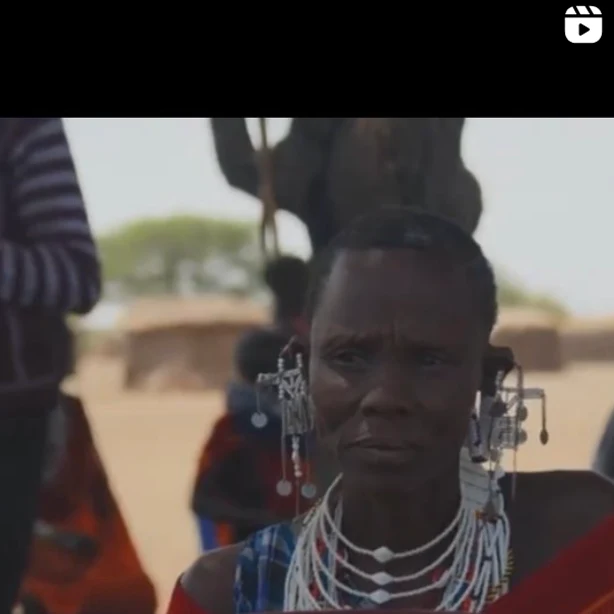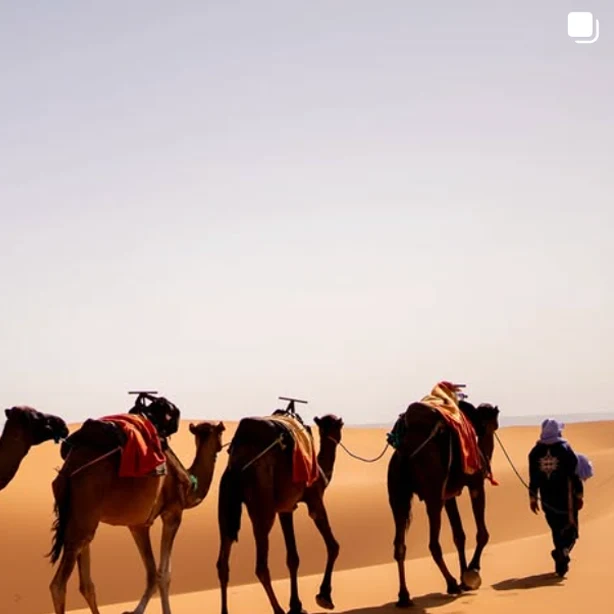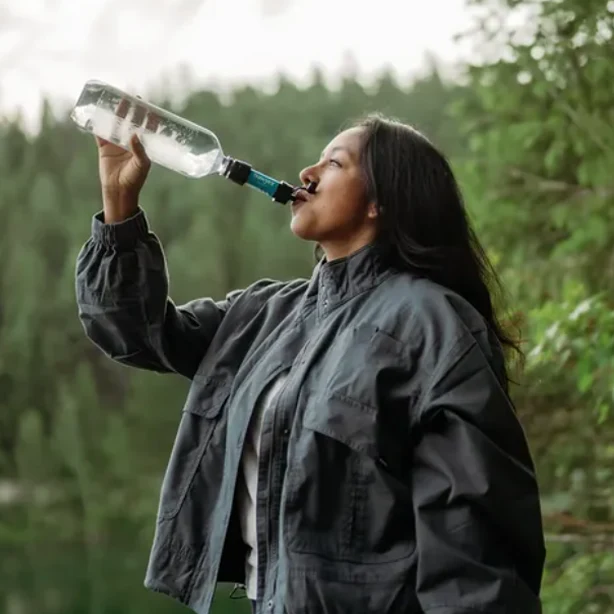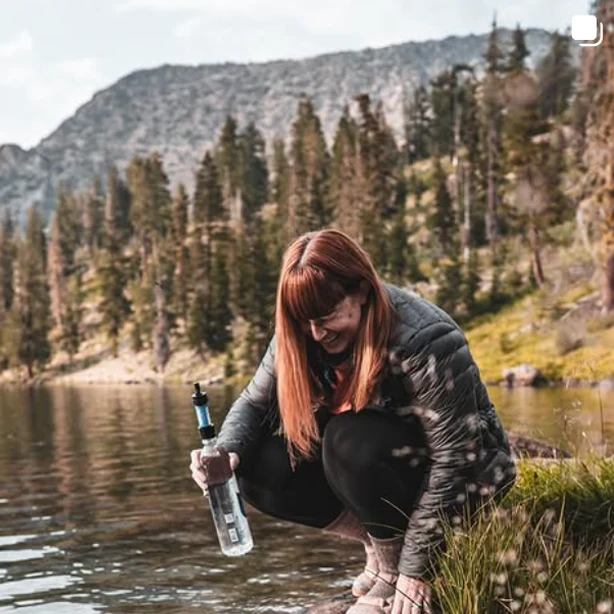This is Why Thru-Hikers Can't Have Nice Things
This is Why Thru-Hikers Can't Have Nice Things

This is Why Thru-Hikers Can't Have Nice Things
YouTube video highlight
Whether you’re in town for a quick resupply or a zero day, I encourage you to be grateful for the communities that support our adventures.
Read more about the projectLet’s paint the picture here:
You're on a long-distance trail, feeling drained, grimy, famished, and eagerly anticipating a stop at the nearest town. You're consumed by thoughts of juicy burgers and mouth-watering ice cream as you push yourself to the limit to reach the hitching spot before sundown. You're racing against the clock, and there are only 1.5 miles left to cover. Your heart is pounding, and you're drenched in sweat, but you finally hear the sound of civilization calling out to you.
You mutter under your breath, "I better get an easy hitch."

Fortunately, you do get a ride and arrive at the restaurant that everyone has been raving about. It's busy, and the wait staff is struggling to be friendly because you smell bad and you've ignored the sign saying "Leave Packs Outside". While feeling hungry and annoyed, you order your food and have an average meal. It turns out that the restaurant wasn't as good as it was hyped up to be. You decide to leave a mediocre tip because the staff was slow to bring you your food and drinks. However, in your self-centeredness, you forget about the many other individuals dining around you who are also being inconsiderate. As you leave the restaurant with a bad attitude, you find out that there is no hot water at the hostel, crushing your dreams of a long, steamy shower and clean laundry.
You think to yourself, "This place is awful."
You decide to vent your frustration on FarOut and write a negative review about the hostel and the town. After sharing your experience with others on the trail, you move on with your journey as if nothing happened. Within hours, you leave the complications you experienced in town behind you. It must be nice, right?

Reflecting on this cringe-worthy experience of a hiker, I invite you to consider whether you or someone you know, have ever exhibited similar behavior. We all likely have, including myself.
This is why I am here to tell you why I believe thru-hikers can’t have nice things.
Before you put your guard up and get defensive, I challenge you to keep an open mind and set aside your ego. It's time to face the truth and make a change.
Let's remember that a thru-hike is an opportunity to connect with nature and explore new communities. While there may be a "dirtbag" aspect to this lifestyle, we must remain respectful towards the people and places that we encounter along the way. By doing so, we can help to foster positive relationships between hikers and the communities that support them.
So let’s dive in.

Stealing “Free” Resources
The trail is a place of freedom, but sometimes that freedom can lead to a sense of entitlement. Entitlement is when someone believes they deserve privileges or special treatment. This ties in with the issue of stealing free resources. For example, taking toilet paper instead of buying your own, stealing clothes that are meant to be borrowed, or sneaking into hostels to use their showers or laundry facilities. When hikers take advantage of these amenities, they can cause harm to the communities that support them.

After years of dealing with "hiker trash" taking advantage of their businesses, trail towns, and hostel owners are tired of it. They know what hikers are up to and they don't like it. It's our responsibility as a community to show respect to these businesses, which are often run as a labor of love for the trail. As much as trail towns are there to support hikers they can only continue to do so if you support them in return. So, the next time you're "dirt bagging it up," try to remember that behind every roll of toilet paper you take, there are 3000+ other hikers with the same thought. Someone is responsible for paying for these resources; that person should be you.

Defining Donation-Based Expectations
Defining "by donation": I have noticed that people often get excited when they hear about businesses offering hiker services on a "by donation" basis. However, it's important to understand that "by donation" doesn't mean free. It usually means that the people offering these services respect the community enough not to charge and trust that people will donate willingly.

During my journey on the Pacific Crest Trail in 2022, I met a woman in Agua Dolce who started hosting hikers at her home to become involved with the community. She went above and beyond by providing laundry, showers, free resupply items, a pool/hot tub, and breakfast. Unfortunately, people did not donate despite her excellent accommodations. Halfway through the season, she got burnt out and felt people were taking advantage of her. As a result, she stopped hosting hikers altogether.
It's important to remember that how we treat the towns and trail communities extends beyond our 24-hour experience there.
If you're staying somewhere on a "by donation" basis, make sure to donate. It can go a long way even if you can only give $5. The community that supports our adventures deserves to be treated with respect. Giving back to the community that has given us so much is the least we can do.

Negative Comments and Their Impacts
Lastly, I want to address the impact of online comments, particularly negative ones. FarOut has become a popular platform for the thru-hiking community, similar to Yelp for the restaurant industry. Unfortunately, many of the comments on the platform tend to be negative and extreme.
While it's important to share your experiences, it's equally important to be constructive and fair in your criticism.

The relationship between hikers and trail businesses should be symbiotic, and we should strive to support each other. I encourage you to think twice before sharing a negative comment on FarOut. Consider whether it's a personal opinion or something that the whole world needs to know. Negative comments can have a lasting impact on a business and its owners. Instead, try to provide constructive criticism that can help the business improve and provide a better experience for hikers.
The trail towns and communities around them are doing their best to support hikers, and hiker season is essential for their livelihoods.
Next time you come across a negative comment on FarOut, take a moment to consider whether _ultradaddy2.0's opinion is worth listening to or if you should go check out the business for yourself.
Let's work together to support each other and make the hiking community a better place.

How to Hike in Harmony
I covered a lot of ground in this message, and honestly, there's so much more I could say. What I hope you take away from this is the importance of being humble. The trail is a special place that deserves to be respected and preserved. There are great resources available, like Appalachian Long Distance Hiker's Association (ALDHA) "Hike in Harmony," which provide further guidance on how to be a better steward of the trail.
At the end of the day, both hikers and their supporting communities are looking for mutual respect.

So whether you’re in town for an afternoon, a zero, or maybe a zeek (zero-week) I encourage you to be grateful for the communities that support our adventures and to support them in return. You are one of thousands of people who pass through every year, and your actions have an impact on future hikers. Let's all strive to set an example of how we would want to be treated if the tables were turned. Put yourself in the shoes of your shuttle drivers, hostel owners, and trail angels, and think about what your expectations would be if you were in their place. Show respect to gain respect.
Remember, you may be just one individual, but we are all part of one community.
This is Why Thru-Hikers Can't Have Nice Things


Let’s paint the picture here:
You're on a long-distance trail, feeling drained, grimy, famished, and eagerly anticipating a stop at the nearest town. You're consumed by thoughts of juicy burgers and mouth-watering ice cream as you push yourself to the limit to reach the hitching spot before sundown. You're racing against the clock, and there are only 1.5 miles left to cover. Your heart is pounding, and you're drenched in sweat, but you finally hear the sound of civilization calling out to you.
You mutter under your breath, "I better get an easy hitch."

Fortunately, you do get a ride and arrive at the restaurant that everyone has been raving about. It's busy, and the wait staff is struggling to be friendly because you smell bad and you've ignored the sign saying "Leave Packs Outside". While feeling hungry and annoyed, you order your food and have an average meal. It turns out that the restaurant wasn't as good as it was hyped up to be. You decide to leave a mediocre tip because the staff was slow to bring you your food and drinks. However, in your self-centeredness, you forget about the many other individuals dining around you who are also being inconsiderate. As you leave the restaurant with a bad attitude, you find out that there is no hot water at the hostel, crushing your dreams of a long, steamy shower and clean laundry.
You think to yourself, "This place is awful."
You decide to vent your frustration on FarOut and write a negative review about the hostel and the town. After sharing your experience with others on the trail, you move on with your journey as if nothing happened. Within hours, you leave the complications you experienced in town behind you. It must be nice, right?

Reflecting on this cringe-worthy experience of a hiker, I invite you to consider whether you or someone you know, have ever exhibited similar behavior. We all likely have, including myself.
This is why I am here to tell you why I believe thru-hikers can’t have nice things.
Before you put your guard up and get defensive, I challenge you to keep an open mind and set aside your ego. It's time to face the truth and make a change.
Let's remember that a thru-hike is an opportunity to connect with nature and explore new communities. While there may be a "dirtbag" aspect to this lifestyle, we must remain respectful towards the people and places that we encounter along the way. By doing so, we can help to foster positive relationships between hikers and the communities that support them.
So let’s dive in.

Stealing “Free” Resources
The trail is a place of freedom, but sometimes that freedom can lead to a sense of entitlement. Entitlement is when someone believes they deserve privileges or special treatment. This ties in with the issue of stealing free resources. For example, taking toilet paper instead of buying your own, stealing clothes that are meant to be borrowed, or sneaking into hostels to use their showers or laundry facilities. When hikers take advantage of these amenities, they can cause harm to the communities that support them.

After years of dealing with "hiker trash" taking advantage of their businesses, trail towns, and hostel owners are tired of it. They know what hikers are up to and they don't like it. It's our responsibility as a community to show respect to these businesses, which are often run as a labor of love for the trail. As much as trail towns are there to support hikers they can only continue to do so if you support them in return. So, the next time you're "dirt bagging it up," try to remember that behind every roll of toilet paper you take, there are 3000+ other hikers with the same thought. Someone is responsible for paying for these resources; that person should be you.

Defining Donation-Based Expectations
Defining "by donation": I have noticed that people often get excited when they hear about businesses offering hiker services on a "by donation" basis. However, it's important to understand that "by donation" doesn't mean free. It usually means that the people offering these services respect the community enough not to charge and trust that people will donate willingly.

During my journey on the Pacific Crest Trail in 2022, I met a woman in Agua Dolce who started hosting hikers at her home to become involved with the community. She went above and beyond by providing laundry, showers, free resupply items, a pool/hot tub, and breakfast. Unfortunately, people did not donate despite her excellent accommodations. Halfway through the season, she got burnt out and felt people were taking advantage of her. As a result, she stopped hosting hikers altogether.
It's important to remember that how we treat the towns and trail communities extends beyond our 24-hour experience there.
If you're staying somewhere on a "by donation" basis, make sure to donate. It can go a long way even if you can only give $5. The community that supports our adventures deserves to be treated with respect. Giving back to the community that has given us so much is the least we can do.

Negative Comments and Their Impacts
Lastly, I want to address the impact of online comments, particularly negative ones. FarOut has become a popular platform for the thru-hiking community, similar to Yelp for the restaurant industry. Unfortunately, many of the comments on the platform tend to be negative and extreme.
While it's important to share your experiences, it's equally important to be constructive and fair in your criticism.

The relationship between hikers and trail businesses should be symbiotic, and we should strive to support each other. I encourage you to think twice before sharing a negative comment on FarOut. Consider whether it's a personal opinion or something that the whole world needs to know. Negative comments can have a lasting impact on a business and its owners. Instead, try to provide constructive criticism that can help the business improve and provide a better experience for hikers.
The trail towns and communities around them are doing their best to support hikers, and hiker season is essential for their livelihoods.
Next time you come across a negative comment on FarOut, take a moment to consider whether _ultradaddy2.0's opinion is worth listening to or if you should go check out the business for yourself.
Let's work together to support each other and make the hiking community a better place.

How to Hike in Harmony
I covered a lot of ground in this message, and honestly, there's so much more I could say. What I hope you take away from this is the importance of being humble. The trail is a special place that deserves to be respected and preserved. There are great resources available, like Appalachian Long Distance Hiker's Association (ALDHA) "Hike in Harmony," which provide further guidance on how to be a better steward of the trail.
At the end of the day, both hikers and their supporting communities are looking for mutual respect.

So whether you’re in town for an afternoon, a zero, or maybe a zeek (zero-week) I encourage you to be grateful for the communities that support our adventures and to support them in return. You are one of thousands of people who pass through every year, and your actions have an impact on future hikers. Let's all strive to set an example of how we would want to be treated if the tables were turned. Put yourself in the shoes of your shuttle drivers, hostel owners, and trail angels, and think about what your expectations would be if you were in their place. Show respect to gain respect.
Remember, you may be just one individual, but we are all part of one community.
This is Why Thru-Hikers Can't Have Nice Things


Let’s paint the picture here:
You're on a long-distance trail, feeling drained, grimy, famished, and eagerly anticipating a stop at the nearest town. You're consumed by thoughts of juicy burgers and mouth-watering ice cream as you push yourself to the limit to reach the hitching spot before sundown. You're racing against the clock, and there are only 1.5 miles left to cover. Your heart is pounding, and you're drenched in sweat, but you finally hear the sound of civilization calling out to you.
You mutter under your breath, "I better get an easy hitch."

Fortunately, you do get a ride and arrive at the restaurant that everyone has been raving about. It's busy, and the wait staff is struggling to be friendly because you smell bad and you've ignored the sign saying "Leave Packs Outside". While feeling hungry and annoyed, you order your food and have an average meal. It turns out that the restaurant wasn't as good as it was hyped up to be. You decide to leave a mediocre tip because the staff was slow to bring you your food and drinks. However, in your self-centeredness, you forget about the many other individuals dining around you who are also being inconsiderate. As you leave the restaurant with a bad attitude, you find out that there is no hot water at the hostel, crushing your dreams of a long, steamy shower and clean laundry.
You think to yourself, "This place is awful."
You decide to vent your frustration on FarOut and write a negative review about the hostel and the town. After sharing your experience with others on the trail, you move on with your journey as if nothing happened. Within hours, you leave the complications you experienced in town behind you. It must be nice, right?

Reflecting on this cringe-worthy experience of a hiker, I invite you to consider whether you or someone you know, have ever exhibited similar behavior. We all likely have, including myself.
This is why I am here to tell you why I believe thru-hikers can’t have nice things.
Before you put your guard up and get defensive, I challenge you to keep an open mind and set aside your ego. It's time to face the truth and make a change.
Let's remember that a thru-hike is an opportunity to connect with nature and explore new communities. While there may be a "dirtbag" aspect to this lifestyle, we must remain respectful towards the people and places that we encounter along the way. By doing so, we can help to foster positive relationships between hikers and the communities that support them.
So let’s dive in.

Stealing “Free” Resources
The trail is a place of freedom, but sometimes that freedom can lead to a sense of entitlement. Entitlement is when someone believes they deserve privileges or special treatment. This ties in with the issue of stealing free resources. For example, taking toilet paper instead of buying your own, stealing clothes that are meant to be borrowed, or sneaking into hostels to use their showers or laundry facilities. When hikers take advantage of these amenities, they can cause harm to the communities that support them.

After years of dealing with "hiker trash" taking advantage of their businesses, trail towns, and hostel owners are tired of it. They know what hikers are up to and they don't like it. It's our responsibility as a community to show respect to these businesses, which are often run as a labor of love for the trail. As much as trail towns are there to support hikers they can only continue to do so if you support them in return. So, the next time you're "dirt bagging it up," try to remember that behind every roll of toilet paper you take, there are 3000+ other hikers with the same thought. Someone is responsible for paying for these resources; that person should be you.

Defining Donation-Based Expectations
Defining "by donation": I have noticed that people often get excited when they hear about businesses offering hiker services on a "by donation" basis. However, it's important to understand that "by donation" doesn't mean free. It usually means that the people offering these services respect the community enough not to charge and trust that people will donate willingly.

During my journey on the Pacific Crest Trail in 2022, I met a woman in Agua Dolce who started hosting hikers at her home to become involved with the community. She went above and beyond by providing laundry, showers, free resupply items, a pool/hot tub, and breakfast. Unfortunately, people did not donate despite her excellent accommodations. Halfway through the season, she got burnt out and felt people were taking advantage of her. As a result, she stopped hosting hikers altogether.
It's important to remember that how we treat the towns and trail communities extends beyond our 24-hour experience there.
If you're staying somewhere on a "by donation" basis, make sure to donate. It can go a long way even if you can only give $5. The community that supports our adventures deserves to be treated with respect. Giving back to the community that has given us so much is the least we can do.

Negative Comments and Their Impacts
Lastly, I want to address the impact of online comments, particularly negative ones. FarOut has become a popular platform for the thru-hiking community, similar to Yelp for the restaurant industry. Unfortunately, many of the comments on the platform tend to be negative and extreme.
While it's important to share your experiences, it's equally important to be constructive and fair in your criticism.

The relationship between hikers and trail businesses should be symbiotic, and we should strive to support each other. I encourage you to think twice before sharing a negative comment on FarOut. Consider whether it's a personal opinion or something that the whole world needs to know. Negative comments can have a lasting impact on a business and its owners. Instead, try to provide constructive criticism that can help the business improve and provide a better experience for hikers.
The trail towns and communities around them are doing their best to support hikers, and hiker season is essential for their livelihoods.
Next time you come across a negative comment on FarOut, take a moment to consider whether _ultradaddy2.0's opinion is worth listening to or if you should go check out the business for yourself.
Let's work together to support each other and make the hiking community a better place.

How to Hike in Harmony
I covered a lot of ground in this message, and honestly, there's so much more I could say. What I hope you take away from this is the importance of being humble. The trail is a special place that deserves to be respected and preserved. There are great resources available, like Appalachian Long Distance Hiker's Association (ALDHA) "Hike in Harmony," which provide further guidance on how to be a better steward of the trail.
At the end of the day, both hikers and their supporting communities are looking for mutual respect.

So whether you’re in town for an afternoon, a zero, or maybe a zeek (zero-week) I encourage you to be grateful for the communities that support our adventures and to support them in return. You are one of thousands of people who pass through every year, and your actions have an impact on future hikers. Let's all strive to set an example of how we would want to be treated if the tables were turned. Put yourself in the shoes of your shuttle drivers, hostel owners, and trail angels, and think about what your expectations would be if you were in their place. Show respect to gain respect.
Remember, you may be just one individual, but we are all part of one community.
Recent articles
Other categories
You might also like
Built for the Outdoors
see ALL PRODUCTS인스타그램 팔로우하기
아웃도어 기업 그 이상.

From the trail
라파 홍보대사를 만나보세요. 이들은 트레일 전문가로서 험난한 환경에 견디는 데카트론 제품을 사랑하고, 한 차원 높은 모험 이야기를 통해 데카트론을 즐겁게 해줍니다.
meet our ambassadors





















